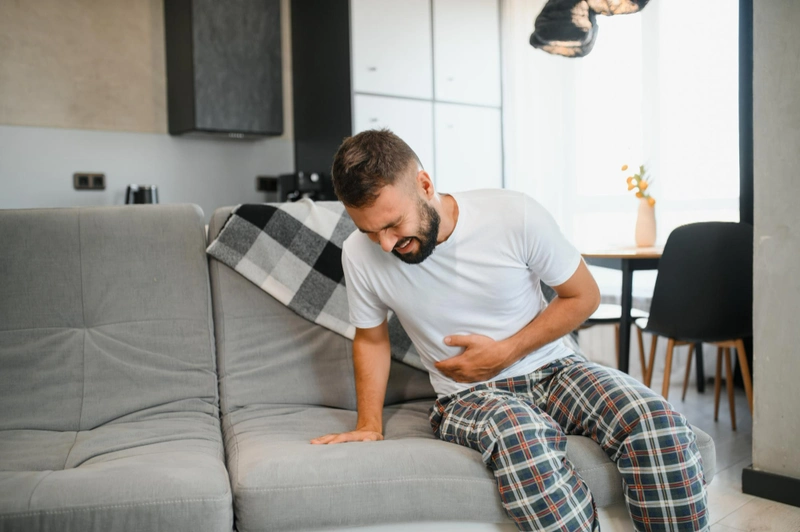Read Blog 
How To Relieve Gas Pain: Simple and Effective Ways
Gas pain is a common problem that almost everyone experiences at some point. It can cause bloating, cramps, and a feeling of pressure in your stomach. While it is usually not serious, gas pain can be uncomfortable and even embarrassing. The good news is that there are many simple ways to find relief quickly.
In this article, we will talk about what causes gas pain, how you can prevent it, and most importantly, how to relieve gas pain naturally and effectively.
What Causes Gas Pain?
Gas pain happens when too much air builds up in your stomach or intestines. Several things can cause this, including:
-
Swallowing air: This can happen when you eat or drink too fast, chew gum, or drink carbonated beverages.
-
Eating gas-producing foods: Foods like beans, cabbage, onions, and carbonated drinks can create more gas in your digestive system.
-
Digestive disorders: Conditions like irritable bowel syndrome (IBS), lactose intolerance, or celiac disease can cause excess gas and bloating.
-
Changes in gut bacteria: An imbalance in your gut bacteria can lead to more gas production.
-
Stress and anxiety: Emotional stress can also affect your digestion and cause gas pain.
Understanding what causes your gas pain is the first step to finding relief.
Symptoms of Gas Pain
Common symptoms of gas pain include:
-
Sharp, cramping pains in your stomach or abdomen
-
A feeling of pressure or fullness
-
Bloating and swelling in the stomach
-
Passing gas (flatulence) or burping
Sometimes, gas pain can feel so intense that people mistake it for heart problems. If the pain is severe or comes with other symptoms like fever, vomiting, or blood in your stool, it is important to see a doctor.
How To Relieve Gas Pain Quickly
Here are some easy and natural ways to relieve gas pain:
1. Move Around
Physical activity can help your digestive system work better. Taking a short walk after meals can encourage the movement of gas through your intestines and reduce bloating. Gentle exercises like yoga poses such as "wind-relieving pose" are especially good for releasing trapped gas.
2. Apply Heat
Using a heating pad or warm towel on your stomach can relax your muscles and help gas pass more easily. Heat increases blood flow and can provide quick relief from cramping pains.
3. Drink Herbal Tea
Certain herbal teas are excellent for digestion and gas pain relief. Peppermint tea, ginger tea, and chamomile tea are especially effective. They help calm the muscles of the intestines and allow trapped gas to move through.
4. Try Gentle Abdominal Massage
Massaging your abdomen in a clockwise direction can stimulate your intestines and help gas move through your system. Use gentle, circular motions and a little bit of pressure for a few minutes.
5. Use Over-the-Counter Remedies
There are several over-the-counter medicines that can help relieve gas pain. Products like simethicone (Gas-X) can break up gas bubbles and make them easier to pass. Always follow the instructions and consult a doctor if you have any concerns.
6. Change Your Eating Habits
How you eat is just as important as what you eat. To prevent swallowing extra air:
-
Eat slowly and chew your food well.
-
Avoid drinking through a straw.
-
Don't talk while chewing.
-
Avoid chewing gum or sucking on hard candies.
Eating smaller, more frequent meals can also help ease digestion and reduce gas buildup.
7. Watch What You Eat
Some foods are more likely to cause gas than others. Common culprits include:
You don't have to avoid these foods completely, but try cutting back and see if your symptoms improve.
8. Stay Hydrated
Drinking enough water helps move food and waste through your digestive system more easily, reducing the chance of gas buildup. Aim for at least 6-8 glasses of water a day.
9. Manage Stress
Stress can cause digestive problems and make gas pain worse. Practice relaxation techniques like deep breathing, meditation, or even just taking a few minutes each day to relax and unwind.
When to See a Doctor
Most of the time, gas pain is harmless and goes away on its own. However, you should see a doctor if:
-
Gas pain is severe and doesn't improve
-
You have other symptoms like vomiting, fever, or blood in your stool
-
You lose weight without trying
-
You experience changes in your bowel habits
These could be signs of a more serious condition that needs medical attention.
Conclusion
Gas pain can be uncomfortable, but it is usually easy to treat with simple lifestyle changes and natural remedies. Moving your body, drinking herbal tea, applying heat, and making small changes to your diet can make a big difference.
If you’re tired of dealing with discomfort, take action today. Try these tips and feel better fast. And remember, if you're looking for more natural and effective solutions, our complete guide on How To Relieve Gas Pain can help you take control of your digestive health and enjoy life without the bloating and cramps!










